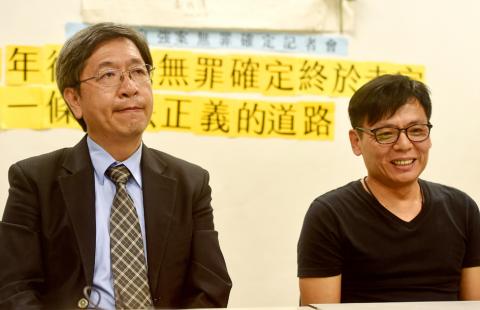In a final decision yesterday, the Supreme Court ruled that former death row inmate Hsu Tzu-chiang (徐自強) was not guilty of the 1995 kidnap and murder of a businessman, rejecting an appeal by prosecutors to end a case that has bounced around the court system for more than two decades and become one of the nation’s highest-profile human rights cases.
Prosecutors had appealed a High Court decision last year to overturn Hsu’s guilty verdict.
Accompanied by lawyers and supporters, Hsu fought back tears at a news conference in Taipei yesterday afternoon.

Photo: Chien Jung-fong, Taipei Times
“When I heard the ruling, it felt unreal to me; maybe I had heard it wrong,” Hsu said. “My mother will celebrate her birthday soon, and this will be the best gift she could get, because over the past 21 years, she has suffered the most.”
“I wanted to give up this fight, as I had given up on the justice system, but my family and my lawyers persisted; they did not want to give up,” Hsu said. “Some people asked if I had bad fortune, but I do not think so, because I feel lucky to be able to walk out of prison.”
Hsu was originally convicted of the September 1995 kidnap and murder of Huang Chun-shu (黃春樹), whose kidnappers sought a ransom of NT$70 million (US$2.2 million at current exchange rates).
Two men, Huang Chun-chi (黃春棋) and Chen Yi-lung (陳憶隆), who were convicted as being the main perpetrators and sentenced to death, had claimed in their trials that Hsu was an accomplice.
Hsu’s saga saw him handed the death sentence nine times and a term of life imprisonment twice, while there were five extraordinary appeals.
He was incarcerated for 16 years, spending most of the time on death row, before being released on May 19, 2012.

MAKING WAVES: China’s maritime militia could become a nontraditional threat in war, clogging up shipping lanes to prevent US or Japanese intervention, a report said About 1,900 Chinese ships flying flags of convenience and fishing vessels that participated in China’s military exercises around Taiwan last month and in January last year have been listed for monitoring, Coast Guard Administration (CGA) Deputy Director-General Hsieh Ching-chin (謝慶欽) said yesterday. Following amendments to the Commercial Port Act (商港法) and the Law of Ships (船舶法) last month, the CGA can designate possible berthing areas or deny ports of call for vessels suspected of loitering around areas where undersea cables can be accessed, Oceans Affairs Council Minister Kuan Bi-ling (管碧玲) said. The list of suspected ships, originally 300, had risen to about

DAREDEVIL: Honnold said it had always been a dream of his to climb Taipei 101, while a Netflix producer said the skyscraper was ‘a real icon of this country’ US climber Alex Honnold yesterday took on Taiwan’s tallest building, becoming the first person to scale Taipei 101 without a rope, harness or safety net. Hundreds of spectators gathered at the base of the 101-story skyscraper to watch Honnold, 40, embark on his daredevil feat, which was also broadcast live on Netflix. Dressed in a red T-shirt and yellow custom-made climbing shoes, Honnold swiftly moved up the southeast face of the glass and steel building. At one point, he stepped onto a platform midway up to wave down at fans and onlookers who were taking photos. People watching from inside

Japan’s strategic alliance with the US would collapse if Tokyo were to turn away from a conflict in Taiwan, Japanese Prime Minister Sanae Takaichi said yesterday, but distanced herself from previous comments that suggested a possible military response in such an event. Takaichi expressed her latest views on a nationally broadcast TV program late on Monday, where an opposition party leader criticized her for igniting tensions with China with the earlier remarks. Ties between Japan and China have sunk to the worst level in years after Takaichi said in November that a hypothetical Chinese attack on Taiwan could bring about a Japanese

The WHO ignored early COVID-19 warnings from Taiwan, US Deputy Secretary of Health and Human Services Jim O’Neill said on Friday, as part of justification for Washington withdrawing from the global health body. US Secretary of State Marco Rubio on Thursday said that the US was pulling out of the UN agency, as it failed to fulfill its responsibilities during the COVID-19 pandemic. The WHO “ignored early COVID warnings from Taiwan in 2019 by pretending Taiwan did not exist, O’Neill wrote on X on Friday, Taiwan time. “It ignored rigorous science and promoted lockdowns.” The US will “continue international coordination on infectious